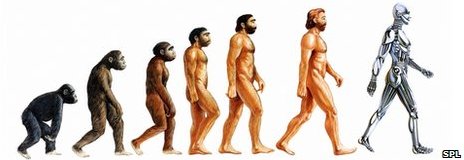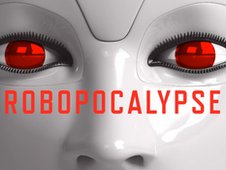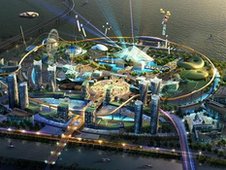
Why are humans scared of robots ?
It is said that humans are most scared of robots similar but not identical to them
"If popular culture has taught us anything, it is that someday mankind mustface and destroy the growing robot menace."

Author and robotic engineer Daniel H Wilson's description of How to Survive a Robot Uprising seems like it is straight out of a robot disaster movie. From Terminator and Blade Runner to Transformers and Star Trek, robots are coming and the impending apocalypse is almost upon us.

The uncanny valley is a graphical representation of the feeling of revulsion humans get when something looks similar butnot quite the same as us
First used by robotics professor Masahiro Mori, his hypothesis is that, as a robot looks more human, we will become more empathetic towards it
When the appearance is"almost-human", that positivity changes to revulsion because of the strangeness felt when something is both familiar yet still alien
As the robot moves towards looking truly human once more, empathy for it returns and increases, until it looks indistinguishable for a human
At least that's what Hollywood would have you believe. And theme parks around the world are spending billions of dollars hoping that the thrill of robots can entice tourists. "The problem with tools - which is what robots are - is that we become dependent on them," says Wilson, whose new novel Robopocalypse is being made intoa film directed by Steven Spielberg. "That's scary, so we contemplatethe disaster scenarios that couldcome from being over-dependent on tools. "It's true - our tools could fail someday - but it doesn't mean they're malevolent or immoral orhave an ethical bias." While he writes about it, he doesnot really believe the end of theworld is coming. And developers are trying to turn the tide of robotic prejudice with a $1.3bn project in South Korea for Robot Land - a theme park and research institute not only using robots for ride technology but using them as waiters and ticket inspectors. Its CEO says he hopes that the rides are a Trojan horse for greater understanding about robot technology. But theme park experts see therobots themselves as a source of the horror that thrill-seekersare looking for. Fast:track's Rajan Datar looks atAsia's next generation of hi-techtheme parks "If you take a normal industrial robotic arm that can twist and throw you around in 3D, it can provide so many more movements and sensations than conventional rollercoasters," says thrill engineer Brendan Walker, director of Thrill Laboratory. "Then you start thinking about controlling our experience through artificial intelligence anddeciding how scared I should be feeling. Maybe I'm going to trust a ride operator to give me a good time but can I trust a computer? "There is this idea of horror that is creeping into rides - darker themes of loss and power and control."
'I'll be back'

Theme parks can be scary placeswhen robots get involved. The 1973 film westworld depicts a fictional robotic tourist destination where, after a safety malfunction, the robots go on a killing spree. In reality, statistics from the International Association of Amusement Park and Attractionsshow that there is a general trend towards increased safety as technology improves.
Robots are not said to be malicious, though don't tell that to the Doctor Similarly, automated public transport systems are believed to be a third more reliable than those in human control and robot-assisted surgery is more precise, with patients recoveringquicker with fewer complications. Removing humans from the process removes, by definition, human error. And while automation as an idea is often worrying, experts think the reality is nothing like as dramatic. "You can see your laptop or your mobile phone as autonomous - it is doing many things without you pressing buttons," says Dr Kerstin Dautenhahn, professor of artificial intelligence at the University of Hertfordshire. "There is nothing scary about robots becoming autonomous, it is just a machine being programmed."
'Tears in the rain'
But where does the idea of robots being evil come from? "Robots were pop culture icons before they even existed," says Wilson. "They were space creatures andmonsters. When robots really started existing, they already had this whole image set up not based on reality. "It'd be like if someone found a living mummy and he was actually a really nice guy but we'd only ever seen evil mummies in fiction. That's exactlywhat happened - a movie monster became real." But this rhetoric has continued, going as far as the president of the United States. When announcing funding for theNational Robotics Initiative, President Obama let those assembled in on a little secret: "You might not know this, but one of my responsibilities as commander-in-chief is to keep an eye on robots," he said. "And I'm pleased to report that the robots you manufacture here seem peaceful - at least for now."

'Resistance is futile'

Despite the president's joke about robotic peace, some of the media already believes that the fight has started. A machine in Robopocalypse wants to burn civilization down to light the way
talked of a robot "attack" on a worker in a factory. Even if these references to an attack rather than a malfunction are meant in jest, this - according to some - only makes the problem worse. "We're so enamoured with the robot-attack story line that it can skew the way real robot-safety issues are discussed," journalist Torie Bosch wrote in Slate. But with robots becoming increasingly advanced, is there aline where an error could become a malicious attack? "Robots are just a bunch of metal and silicon," says Prof Dautenhahn. "They have no agenda - this is what's different from the movies. They have no hideous plan. "You should not be scared of robots. If you are scared, then you are scared of the people building them." Robot Land developers hope thisrepresents the future of theme parks And with the new creations comes something that engineers feel is often overlooked - the achievement of making life better. "Any new ability that robots gainis a human triumph," says Wilson. "There's a lot of room in the universe. Having incredibly able machines is only ever going to be a good thing for people." And both Hollywood and tourist companies are still pouring money into robotic entertainment. Universal Studios, first in Singapore on December 3 and then LA in 2012, are hoping visitors will flock to the first ridebased on the film Transformers. The promise of 3D video and audio-animatronics - where the robot make noise itself - is expected to be a spectacular ride.
'Is that all you got, Megatron?'

So if robots are such a great thing, what do engineers think we should be afraid of? Nanotechnology is the science ofchanging and developing new materials on a molecular and atomic level. The Center for Responsible Nanotechnology suggests that with these new developments comes "severe dangers" if used inappropriately. Its theory goes that "the small size, portability, and rapid potential for proliferation will make nano-built weaponry difficult to control and hard to keep out of the hands of terrorists". And this is a view that is shared by at least one artificial intelligence expert. "I'm more afraid of things that can be manipulated that I cannotsee," says Prof Dautenhahn. "With robots, it is something I can see so, if it malfunctions, you can unplug it and shut it down. If you have billions of nano-particles, there is no way you can do the same thing."